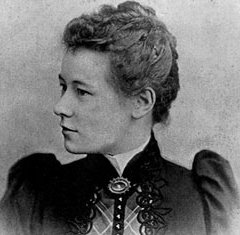Tax Resistance League.
On , Mrs. [Margaret] Kineton Parkes addressed a meeting of the members of the Fleet National Union on the principles of tax resistance, and a ballot was taken in order to instruct delegate how to vote at July Conference.
On , a drawing room meeting was given by Mrs. [Louisa] Jopling Rowe in her large studio, and she herself presided.
Speeches were made by Mrs. [Caroline] Louis Fagan, Mrs. Kineton Parkes and Mr. Laurence Housman, the latter dealing in a most interesting and exhaustive way with the tax resistance movement from an historical point of view.
A very successful protest was made at Finchley on in connection with the seizure of property belonging to Miss [Sarah] Benett, late hon. treasurer of the W.F.L.
By courtesy of the auctioneer, Miss Bennet, was allowed to explain her reason for resisting payment of taxes.
A very successful open-air meeting was held afterwards.
Another article in the same issue contained this note:
Mrs. [Edith] How Martyn announced that Mrs. [Emma] Sproson, a member of the National Executive of the Women’s Freedom League, was serving a term of seven days’ imprisonment in the third division for refusing to pay her dog license.
This was the third time Mrs. Sproson had suffered imprisonment in connection with the militant suffrage agitation.
The Women’s Freedom League had taken up tax-resistance as a part of their propaganda three years ago.
Mr. Keir Hardie had stated in the House of Commons that twenty-five million pounds flowed yearly into the coffers of the national exchequer as a result of the indirect taxation of women.
If that money could be withheld, or if all women who were directly taxed would refuse to pay until they were enfranchised, they would not long have to wait for their political emancipation.
The speaker then dealt with the political situation as regards the Women’s Bill.
Miss Andrews Released.
On , Miss Constance Andrews — our honorary organizer for the East Anglian district — was arrested and taken to Ipswich gaol, there to spend a week because she refused to pay her dog tax.
Here was a chance for the local branch, and they seized it.
I went down on , and we soon got all the preliminary arrangements made for a welcome to Miss Andrews.
The little town has been buzzing with suffragettes and their doings.
Everyone has been talking of Miss Andrews and our preparations to receive her.
Open-air meetings, bill-distributing, the carrying of trimmed posters, pushing the decorated coster’s barrow (covered with The Vote and posters) through the town, — all have served to draw the attention of the townsfolk to the fact that something unusual was astir.
Our two meetings on Cornhill were well attended, and the behaviour of the crowds was remarkably good.
On morning a very large crowd — described in the local press as “an immense gathering” — collected outside the prison to cheer Miss Andrews on her release.
Mrs. [Charlotte] Despard — “the grand old lady of the Women’s movement,” to quote again from the East Anglian Daily Times — drove up in an open cab, with Mrs. [Isabel] Tippett and Mrs. Bastian.
Shortly after her arrival Miss Andrews was released, a photographer standing on a wall opposite the prison gate being the first to give the news.
The outer gate opened, and as our ex-prisoner came out a lusty chorus of “hurrahs!” showed the sympathy of the crowd.
Mrs. Despard said a few words of welcome, and then we formed up in a little procession behind the Ipswich “Dare to be Free” banner, and walked to our rooms in Arcade-street, the cab with Miss Andrews in Mrs. Tippett’s place bringing up the rear.
The large crowd followed us all the way, and enquiring heads were thrust through open windows all along the route.
On our arrival at the rooms, we found a dainty breakfast set out for us at long tables, placed at right-angles to each other.
Japanese table napkins, floral decorations, placards on the walls, all were in the green, white and gold.
After breakfast Mrs. Hossack, from the chair, paid a warm tribute to Miss Andrew’s work.
Mrs. Despard, in her own inspiring way addressed the gathering after the enthusiastic singing of “For she’s a jolly good fellow,” and Miss Andrews gave us a vivid account of her life in prison.
Among other things, she said there were only four other women besides herself in prison.…
…Altogether we feel that Miss Andrews has done a great service to the local work by her protest and imprisonment, and made possible a splendid week’s work, which we hope will leave a lasting impression.
Marguerite A. Sidley.

